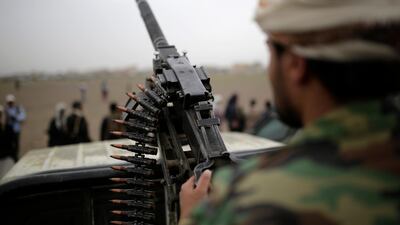Hundreds of families in war-ravaged areas of northern Yemen’s Al Jawf province have been trapped after the Iran-backed Houthi rebels seized a city, leaving aid agencies struggling to reach them.
The rebels seized control of Al Hamza in Al Jawf on Sunday, government officials said.
Civilians who fled their homes in Al Gheil district to Al Hazem district in southern Al Jawf told The National that hundreds of families remain caught in areas beset by conflict.
Others fled to the desert in eastern Al Jawf because the main route that links the province to Marib province and Sanaa, the capital, has been cut by the Houthis.
"The war has been raging in our areas for more than 20 days," Ahmed Khaled, who fled his home in Al Gheil, told The National.
"We managed to stay in our homes but the clashes fiercely intensified. My kids were living in fear, they had many sleepless nights.
“Our lives were worsening as the Houthis controlled large areas of Al Gheil district. They started forcing the residents to pick up their guns and go to fight with them.”
Saleh Jamalah, the deputy governor of Al Jawf, said the rebels had started imposing a strict siege around the province, cutting phone and internet services.
Yemen's internationally recognised government has been battling the Houthi rebels since 2014 when they captured the capital Sanaa and large areas of the impoverished Arab nation.
The government has been backed by a Saudi-led military coalition since 2015.
Najeeb Al Sadi, the chairman of the displaced people's unit in the government relief committee, said the situation in Al Jawf could become catastrophic.
“The situation in the clashes areas is really harsh," Mr Al Sadi said. "Nine hundred families have fled their homes in the southern districts of Al Gheil and Al Khalaq as the clashes intensified.
“Some families arrived to safe areas on the borders between Al Jawf and Marib. Meanwhile many families fled their homes to the desert in the district of Khab and Al Shaaf in eastern Al Jawf.
"They have been living in very harsh conditions in the open where they have no shelters, no tents, and suffer food and water shortages.”
Aid agencies cannot reach the displaced people easily to provide them with aid supplies because of the main route being cut between Al Jawf and Marib and Sanaa.
Fahmi Salmeen, head of Al Kheir Coalition, a local independent relief agency that co-ordinates with the King Salman Humanitarian Aid and Relief Centre, said his organisation distributed emergency aid supplies to those who fled to the desert in eastern Al Jawf in the past couple of days.
“We hardly reached those who fled their homes to the desert," Mr Salmeen said. "We distributed some tents and other lifesaving supplies.
“The problem is that all of the aid we delivered in the past couple of days was stored in our warehouse in Al Jawf downtown.
“We will not be able to carry out the mission if the aid in our stores runs out because the main route is cut. We can’t transfer new supplies from outside Al Jawf.”
On Friday, the UN special envoy for Yemen, Martin Griffiths, strongly condemned the recent military escalation in Al Jawf.
“I’m deeply disappointed and dismayed by the continued wave of military escalation in Yemen," Mr Griffiths said.
"I am particularly alarmed by this reckless military attitude that runs counter to the stated desires of all sides to reach a political solution."

